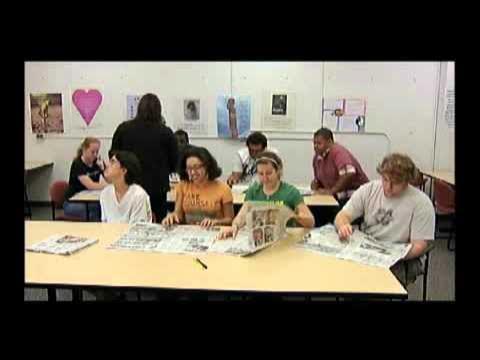Understanding Classroom Discourse (With Steve Walsh)
Summary
TLDRIn this TEFL training institute podcast, Professor Steve Walsh from Newcastle University delves into classroom discourse, exploring the significance of teacher-student interactions. Walsh discusses common teaching practices like elicitation, error correction, and feedback, emphasizing their impact on learning. He advocates for a balance between display and referential questions to foster genuine student engagement. The conversation also touches on the role of institutional discourse, the influence of cultural context on teaching practices, and the importance of adapting teacher roles to enhance the learning experience.
Takeaways
- 😀 Classroom discourse refers to all interactions in the classroom, focusing on teacher-student exchanges.
- 📚 Elicitation, error correction, and feedback are key classroom practices that require language.
- 🗣 Feedback is critical in the classroom but has been harder to gauge during online teaching due to lack of visual cues.
- ❓ Display questions are commonly used in classrooms to prompt students to show what they know, but referential questions could encourage more authentic interactions.
- 🤔 Teachers should balance the use of display and referential questions to promote more genuine student engagement.
- 🎯 The language teachers use should align with their teaching goals. For example, promoting fluency requires more open-ended questions.
- 🏫 Classroom interactions are structured and follow institutional rules, making them different from casual conversations.
- 🌍 Cultural context influences teaching roles and expectations, but teachers need to adapt based on the immediate classroom needs.
- 🔄 Teacher roles should be flexible, varying throughout the lesson based on the activity and learning goals.
- 💼 External pressures, such as from parents or exam requirements, can also shape how teachers behave in the classroom.
Q & A
What is classroom discourse according to Steve Walsh?
-Classroom discourse covers all the interactions that take place in any classroom, including the actual recording, observation, and transcript of those interactions.
Why is studying classroom discourse important?
-Studying classroom discourse is important because it shows what's happening in a classroom, providing insights into whether teaching and learning are occurring.
What are the common teaching practices that involve language?
-Common teaching practices that involve language include asking questions, correcting errors, giving feedback, and managing learning through instructions and organization.
How does feedback play a role in online teaching during the COVID-19 pandemic?
-Feedback is crucial in online teaching as it helps teachers understand if students are understanding or learning. However, during the COVID-19 pandemic, the lack of visual cues like head nods and smiles makes it challenging to gauge student comprehension.
What is the difference between elicitation, repair, and feedback in classroom discourse?
-Elicitation is about getting students to say something by asking a question. Repair refers to the ways teachers correct errors. Feedback is the information teachers and students give to each other to understand what's going on in the classroom.
Why is it suggested to push learners for 'pushed output' in the classroom?
-Pushing learners for 'pushed output' is suggested to encourage more extensive responses from students, thus promoting deeper learning and engagement beyond simple yes/no answers.
What are display questions and referential questions in the classroom?
-Display questions are those where teachers know the answers and are used to prompt students to display their knowledge. Referential questions are genuine inquiries where teachers do not know the answers and are aimed at accessing information and showing interest in students' experiences.
How do institutional discourse settings differ from everyday conversations?
-Institutional discourse settings like classrooms have specific rules and roles that restrict the types of interactions that can occur, making them different from more informal, everyday conversations.
What influences the role a teacher adopts in the classroom?
-The role a teacher adopts in the classroom is influenced by factors such as the lesson's micro-context, teaching goals, cultural expectations, and external pressures like curriculum, assessment, and examinations.
Why is it beneficial for teachers to vary their roles during a lesson?
-Varying their roles allows teachers to match their interaction style with the lesson's goals, promoting effective teaching and learning by adapting to the needs of the students and the subject matter.
How can understanding classroom discourse contribute to a teacher's professional development?
-Understanding classroom discourse can contribute to a teacher's professional development by providing insights into effective teaching practices, student engagement, and strategies for enhancing learning outcomes.
Outlines

Этот раздел доступен только подписчикам платных тарифов. Пожалуйста, перейдите на платный тариф для доступа.
Перейти на платный тарифMindmap

Этот раздел доступен только подписчикам платных тарифов. Пожалуйста, перейдите на платный тариф для доступа.
Перейти на платный тарифKeywords

Этот раздел доступен только подписчикам платных тарифов. Пожалуйста, перейдите на платный тариф для доступа.
Перейти на платный тарифHighlights

Этот раздел доступен только подписчикам платных тарифов. Пожалуйста, перейдите на платный тариф для доступа.
Перейти на платный тарифTranscripts

Этот раздел доступен только подписчикам платных тарифов. Пожалуйста, перейдите на платный тариф для доступа.
Перейти на платный тарифПосмотреть больше похожих видео

Classroom behavior

How to improve curriculum planning in schools - Podcast

TUGAS PODCAST PROFESI PENDIDIKAN - PENINGKATAN DAN PENGEMBANGAN PROFESIONALISME GURU -

Why it's so hard to talk about the N-word | Elizabeth Stordeur Pryor

Most Googled: initial teacher training (ITT)

Scott Thornbury - How to Answer Learners' Grammar Questions
5.0 / 5 (0 votes)
